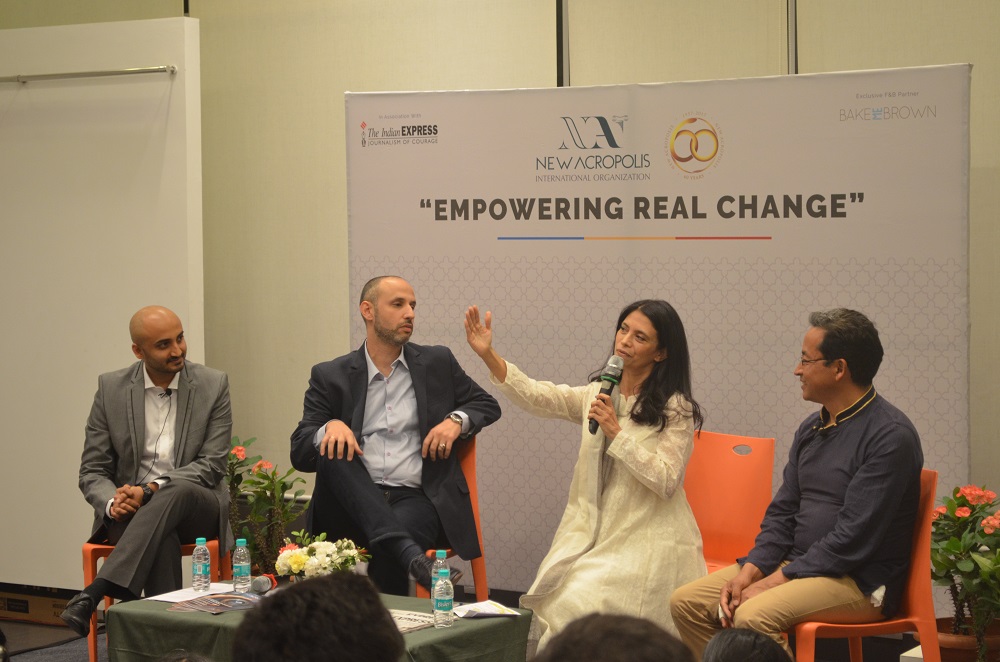Idealism, Philosophy, Volunteering – Three Pathways for Change
Article By Gilad Sommer
 Many of us wish to change the world. But how can it be done?
Many of us wish to change the world. But how can it be done?
First of all, it is obvious we are not just seeking to change the world – the world is changing anyhow, regardless of what we do. The ancient philosophers wisely stated that the only permanent thing in the world is change.
In reality, it is not change we seek, it is a certain, positive, change – a diversion of the river’s flow, an orientation towards a brighter future for humanity.
Second, none of us by ourselves can really make a meaningful impact.
Although we are all familiar with names of great people who have motivated great historical changes, great people are few and exceptional. That is why they are great.
Notwithstanding, even these great people did not work alone. They were a tip of an iceberg, the peak of a mountain, but never an isolated island.
So what are the pathways to make this change happen?
We must be idealists, because only an idealist can imagine a better world.
We must be philosophers, because only a lover of wisdom, free of subjectivity and prejudice, can find the right means to realize one’s ideals.
We must be volunteers, because this new world will not be built by thoughts, prayers or wishes, but only by action – action realized freely, efficiently and with the best intentions.
Let’s explore these pathways a little bit more in depth.
Idealism
An Idealist intuits the gap between what is and what can be. An idealist sees with the heart, imagines a possible future – dreams of a better world.
Idealism was the bread and water of Socrates, Plato and the classical philosophy schools, it was at the root of the Renaissance, the United States, and the civil rights movements.
It is at the heart of every fighter for justice and every true artist and religious leader.
Without Idealism there is no progress. Progress not in the sense of new technologies, but in the true sense of human progress – self-knowledge and self-realization.
Philosophy
Philosophy is the love of wisdom. The philosopher aspires to recognize truth and to live by it.
Philosophy is the opposite of dogma and prejudice. A philosopher never gets attached to opinions, putting knowledge under the constant test of reality and the inner spotlight of reason.
Just like Socrates, philosophers are the gadflies of society, always pointing out the falseness, and at the same time they give an example of an ethical life.
Volunteering
Volunteering today is conceived as an act done without monetary compensation, but the origin of the word is the latin voluntarius, which means of one’s free will, and refers to an action that is taken voluntarily – whether one is paid for it or not is of secondary importance.
But in order to act of our own free will, we must first free our will.
Acting out of a desire for compensation, of a desire to be liked, out of fear, flattery or coercion, are just a few examples of how our will can be enslaved by the lower aspects of our nature.
An Integrated Approach
Idealism, Philosophy, Volunteering – these three pathways must be integrated to achieve useful, positive and long-lasting results.
To be an idealist without the reflections of philosophy, is a recipe for fanaticism. Many fanatics may actually intuit the archetypal-spiritual realities, and in their core want to make the world a better place, but without the reflection and inner investigation of philosophy, their efforts are tainted by their own personal inclinations, preconceptions and prejudice. They do not examine their beliefs in the light of reason, and therefore their image of a better world becomes a reflection of their own subjective imaginings and past-experiences.
Let’s not forget that the road to Hell is paved with good intentions.
When joined with philosophy, Idealism acknowledges that the first and most important change must take place within ourselves. We can’t ask others to do what we ourselves cannot.
We dream of world peace, but are unable to make peace with our neighbours or our parents. We speak against violence and for acceptance, but woe to the person who disagrees with us. We speak for compassion towards animals, but treat our fellow human beings with contempt.
Making a change in the world is like making a ripple in the water, it begins in the center, and the center for each one of us is always our selves.
Volunteering without philosophy is also useless, as it becomes a sisyphean task, like a doctor who repeatedly treats the symptoms but is never able to treat the disease. This is how we get endless wars on hunger, poverty, drugs and war itself, which never seem to go anywhere or to make real progress.
When great leaders such as the Buddha or Jesus, Martin Luther King, or Mahatma Gandhi, sought to help humanity, they tried to transmit certain knowledge to help people understand themselves and live better, in other words, they taught philosophy. It is always better to teach an hungry man to fish, than to give him fish.
Finally, Idealism and philosophy without volunteering, is like a soul without a body.
Without volunteering, idealism and philosophy remain a good-willed, but impractical, approach to life. It doesn’t lead to any practical results and remains no more than fanciful daydreams. The power of the mind is certain, but we cannot think our way towards a better world.
In the history of humanity, no positive change has ever taken place without the efficient action of good-willed individuals, groups and communities, who knew how to integrate Idealism, Philosophy and Volunteering.
The entity posting this article assumes the responsibility that images used in this article have the requisite permissionsPermissions required for the publishing of this article have been obtained




Thoughtful article, beautifully brings together 3 streams of human endeavour. Connected dots and gave me a new insight on topics that have become jaded. Thanks!